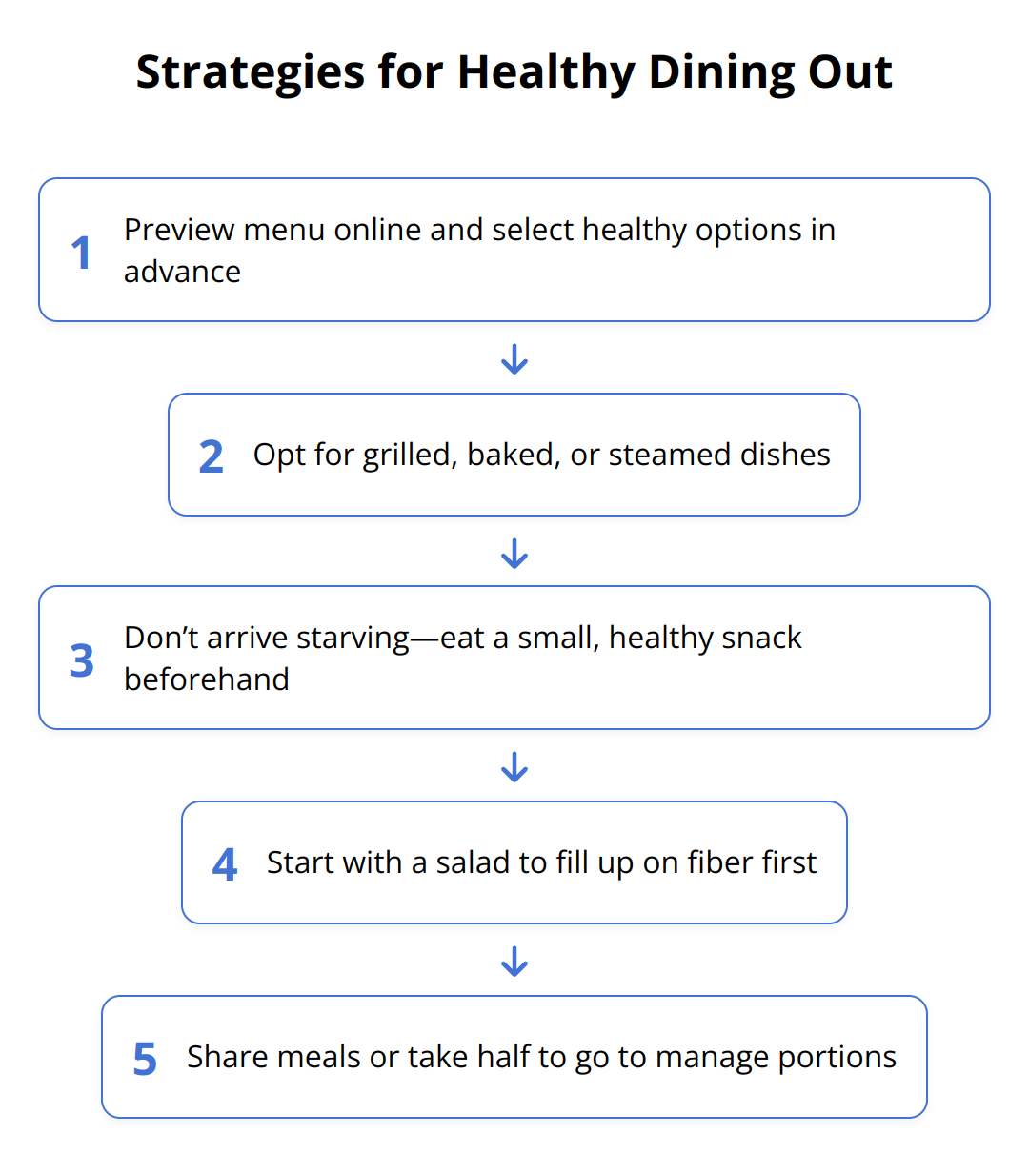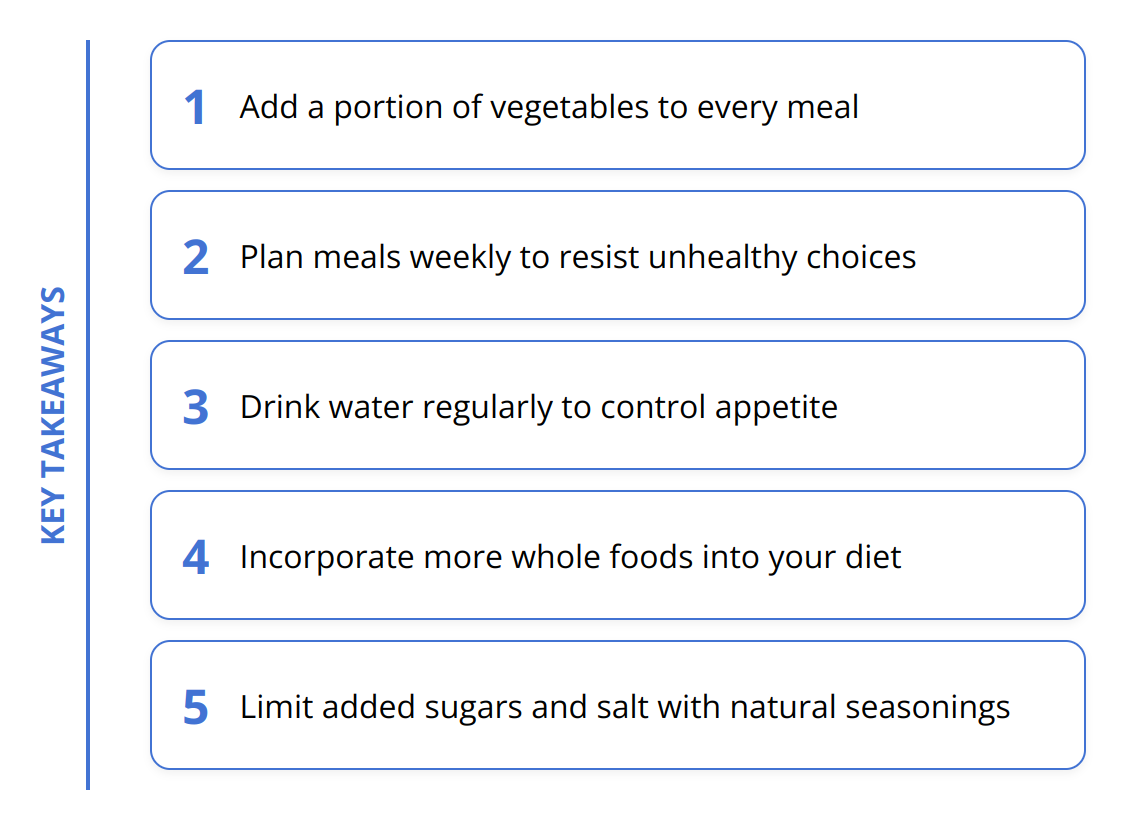How to Develop Healthy Eating Habits

At Healthy Tips You Blog, we understand the importance of cultivating healthy eating habits for a balanced and fulfilling life. Initiating and maintaining these habits can often seem overwhelming, but it doesn’t have to be.
Our guide aims to break down the complexities of nutrition and offer straightforward, actionable advice. We’ll explore practical tips and strategies to overcome common challenges, ensuring you’re equipped to make informed decisions about your diet.
Understanding Healthy Eating
Healthy eating is more than just choosing fruits over fries; it’s about finding a balance that works for your body. This balance involves consuming various nutrients in the right quantities to support bodily functions, maintain energy levels, and support mental health. It isn’t about strict dietary limitations or depriving yourself of the foods you love.

The Real Meaning of Nutrition
Nutrition is the foundation of a healthy diet. It’s essential for good health, empowering our bodies to perform daily tasks, fight off diseases, and maintain mental wellness. Eating a well-balanced diet filled with a variety of fruits, vegetables, lean proteins, and whole grains can help prevent chronic diseases such as heart disease, diabetes, and obesity.
Tackling Common Diet Myths
One of the biggest hurdles in achieving a healthier diet is navigating through the sea of misconceptions. Let’s set the record straight:
- Myth 1: Carbs are the enemy. The truth is, your body needs carbs for energy. It’s about choosing the right types, like those from whole grains, fruits, and vegetables, and avoiding processed ones.
- Myth 2: Fat makes you fat. Fats are essential for your body to absorb vitamins and provide energy. The key is to prioritize healthy fats found in avocados, nuts, and fish.
- Myth 3: Diet foods can help you lose weight. Many diet foods compensate for reduced fat with added sugar or salt, making them no healthier than their regular counterparts.
Practical Tips for Nutritious Eating
- Start Small: Overhauling your diet overnight can be overwhelming. Begin with small changes, like adding a portion of vegetables to every meal.
- Plan Ahead: Meal planning can help you control portions, reduce waste, and resist the temptation of unhealthy fast food. For insights on planning balanced meals, check out our meal planning guide.
- Listen to Your Body: Eat when you’re hungry but stop before you’re stuffed. Learning to recognize true hunger can prevent overeating.
- Stay Hydrated: Often, we mistake thirst for hunger. Drinking water throughout the day can help control appetite and improve metabolism.

By incorporating these strategies into your life, you’re not just eating better; you’re taking a giant leap towards a healthier and happier you. Remember, healthy eating is a marathon, not a sprint. It’s about making more healthful choices that fit into your lifestyle, allowing you to reap the benefits both now and in the future.
Building Healthy Eating Habits
Embarking on a journey towards healthier eating habits entails more than just choosing salads over burgers. It’s about establishing a long-term mindset that embraces variety, moderation, and balance. Here are definitive ways to make healthier eating a sustainable part of your lifestyle.
Embrace a Varied Diet
The cornerstone of nutritious eating is variety. Your body thrives on a wide range of vitamins, minerals, and other nutrients that no single food can provide. Including a colorful array of fruits and vegetables in your diet ensures you’re getting a broad spectrum of nutrients. Opt for whole grains to enrich your fiber intake and choose lean proteins to support muscle health without excess calories.
Plan Wisely
Meal and snack planning is not just a tool for weight loss; it’s a strategy to maintain a balanced diet. Start by drafting a weekly meal plan. This can help you avoid the pitfall of making unhealthy food choices due to lack of preparation. When shopping, stick to your grocery list to resist impulse buys. For practical meal planning tips, visit our meal planning guide.
Understand Food Labels
Making informed choices requires understanding what you’re eating. Reading nutrition labels can often feel like deciphering a complex code, but it’s essential for identifying hidden sugars, fats, and sodium in packaged foods. Look beyond the calories — focus on the quality of ingredients, serving sizes, and nutrient content. Foods high in fiber, vitamins, and minerals offer more value for your body than those packed with empty calories.

Implement Lasting Changes
- Incorporate More Whole Foods: Aim for foods in their least processed form. These tend to be more nutrient-dense and lower in added sugars and unhealthy fats.
- Stay Hydrated: Drink water regularly. Sometimes hunger is actually thirst in disguise.
- Limit Added Sugars and Salt: Enhance flavors with herbs, spices, and other natural seasonings instead.
- Practice Mindful Eating: Pay attention to your body’s hunger signals and eat slowly to enjoy every bite.
- Avoid Emotional Eating: Find healthy ways to deal with stress and emotions, such as going for a walk or practicing yoga.
Adopting healthier eating habits isn’t solely about dietary restrictions or unrealistic goals. It’s about making better choices, understanding the value of nutrition, and enjoying a more vibrant, healthier you. Remember, consistency is key. Gradual changes in your diet can lead to lasting habits over time.
Overcoming Eating Challenges
Adopting healthier eating habits is a commendable goal, but several roadblocks can make the path challenging. From dealing with cravings to maintaining motivation, the journey to a healthier lifestyle is fraught with hurdles. However, with the right strategies, these challenges can be managed effectively.
Conquering Cravings and Emotional Eating
Cravings and emotional eating are significant obstacles. Stress, boredom, and emotions often trigger these unhealthy eating patterns. The first step to overcoming them is recognizing the triggers. Once identified, it becomes easier to address the root cause rather than succumbing to temporary relief through food.

Practical tips to manage cravings include:
- Keep unhealthy snacks out of reach. If it’s not within easy access, it’s not on your menu.
- Have healthier alternatives ready. Craving something sweet? Try a piece of fruit or a small serving of dark chocolate.
- Understand that it’s okay to indulge occasionally, but moderation is key.
Emotional eating requires a more nuanced approach. Addressing the underlying emotions through healthy outlets such as exercise, meditation, or talking to a friend can provide the comfort you might be seeking from food.
Navigating Social Situations and Dining Out
Social gatherings and dining out don’t have to derail your healthy eating habits. Planning is your best strategy. If you know you’re going to a restaurant, preview the menu online and decide what to order in advance. Opt for dishes that are grilled, baked, or steamed, and don’t be afraid to ask for customizations to suit your preferences.

Here are a few key strategies for dining out:
- Don’t arrive starving; eat a small, healthy snack beforehand to avoid overeating.
- Start with a salad to help fill up on fiber-rich foods first.
- Share meals or take half to go to manage portion sizes.
Social situations require a balance of assertiveness and flexibility. It’s alright to politely decline food that doesn’t meet your nutritional goals. Bringing your own healthy dish to share ensures that you have a good option available.
Staying Motivated and Tracking Progress
Maintaining motivation is crucial for long-term success. Setting realistic goals and celebrating small victories along the way can keep spirits high. Additionally, tracking your progress, whether through a food journal or an app, helps maintain accountability and enables you to see how far you’ve come.
Some effective ways to stay motivated include:
- Set short-term goals along with long-term aspirations. Achieving these smaller goals will provide a sense of progress.
- Celebrate non-scale victories, like fitting into an old pair of jeans or noticing improved energy levels.
- Find a support system, either online or in person, to share your journey and challenges.
Remember, overcoming these challenges isn’t about perfection; it’s about making more health-conscious choices more often. Every decision to eat healthily is a step forward in your journey towards a healthier lifestyle. For more practical advice on nutritious eating, explore our guide to keto diet and its benefits for weight management.
Final Thoughts
As we wrap up, it’s clear that healthy eating is not about drastic changes or depriving yourself. It’s about making smarter choices that contribute to your well-being. We’ve covered various practical tips and strategies, from understanding nutrition to tackling diet myths and embracing variety in your meals. The key takeaways include starting small, planning ahead, staying hydrated, and incorporating whole foods into your diet.

Encouragement to start small and be consistent cannot be overstated. Small, manageable changes in your diet can lead to significant, lasting improvements over time. Remember, it’s the cumulative effect of these choices that leads to a healthier lifestyle, not overnight changes.
The lifelong benefits of healthy eating habits extend far beyond physical health, impacting mental well-being and overall life satisfaction. Adopting habits like those outlined in the renowned Mediterranean diet can lead to a heart-healthy lifestyle, support weight management, and enhance vitality. This diet, rich in vitamins, minerals, and antioxidants, is just one example of how a balanced approach to eating can improve your health in the long run.
At Healthy Tips You Blog, we’re committed to guiding you towards making more informed choices about your diet. Our goal is not just to provide information but to support you in adopting a healthier, more vibrant lifestyle. By understanding the value of nutrition and making more healthful choices, you’re taking significant steps toward a happier and healthier you.
In conclusion, healthy eating is a journey that involves learning, adapting, and growing along the way. It’s about finding joy in the foods that nourish your body and soul. So take that first step, no matter how small, and remember that we’re here to support you every step of the way on your path to a healthier life.

![Seasonal Fruit Desserts [Guide]](https://healthtipsyou.com/wp-content/uploads/2024/04/Seasonal_Fruit_Desserts__Guide__2024_04_19_07_21_03_141215_00_00-768x439.jpeg)





15 Comments